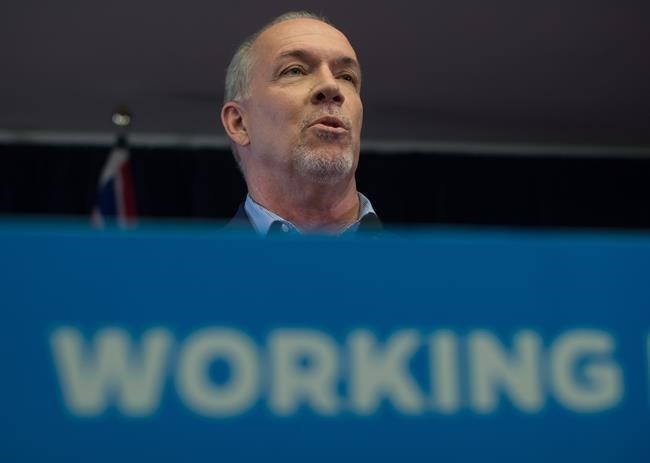
B.C. NDP Leader John Horgan speaks during a post election news conference in Vancouver, B.C., on Wednesday May 10, 2017.
Image Credit: THE CANADIAN PRESS/Darryl Dyck
May 11, 2017 - 8:30 AM
VICTORIA - The election of a minority government in British Columbia already has political parties pondering common ground between them as everybody awaits the final results.
With more than 176,000 absentee ballots still to be counted by Elections BC, final totals are due by May 24.
The election Tuesday saw the Liberals win 43 seats, the New Democrats 41 and the Greens three seats, giving them the balance of power. A majority is 44 seats in the 87-seat legislature.
Premier Christy Clark said Wednesday she intends to form a government and is willing to work with others to stay in office.
"In terms of whatever the outcome is, whether it's a minority or a majority, I do intend to make sure we work across party lines with parties that want to work with us," she said.
Clark said she has had a good working relationship with Green Leader Andrew Weaver.
Weaver said the Greens are open to talking to both the Liberals and New Democrats about governing, but until the votes are counted it's too early to discuss political deals.
But he said the Greens, who do not accept political donations from corporations or unions, are committed to removing them entirely from B.C. politics.
"It is a non-negotiable issue for us," said Weaver.
NDP Leader John Horgan said Wednesday he wasn't ready to discuss making deals until the vote count is complete, but in the final days of the campaign he called on Green voters to support the NDP, citing the common goals they share.
Here are a few potential common ground issues that could produce deals in a minority B.C. government:
Campaign finance reform: The Greens do not accept donations from corporations or unions. The NDP has tabled legislation on six occasions proposing to ban union and corporate donations. The Liberals say they will appoint a non-partisan panel to review fundraising reforms.
Electoral reform: The Greens want to introduce electoral reforms to replace the current first-past-the-post system. The New Democrats support electoral reform but want approval through a provincial referendum. The Liberals are not considering electoral reform.
Pipelines: The Greens do not support the Kinder Morgan Trans Mountain pipeline expansion project and will work to stop it from proceeding. The NDP also do not support the pipeline project. The Liberals say the proposed pipeline is a federal project, but the government was able to achieve environmental protections and financial benefits for the province.
Carbon tax: The Greens' plan would increase the carbon tax over the next four years from $30 a tonne to $70 a tonne. The Liberals would increase the carbon tax to $50 a tonne by 2020. The NDP also plans to increase the carbon tax to $50 a tonne.
News from © The Canadian Press, 2017